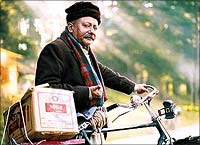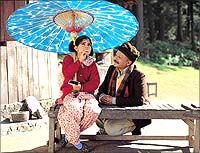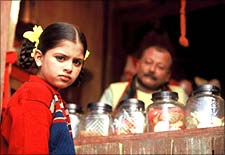You could just call him Midas. Give Pankaj Kapur a great role and enough room to improvise, and the result on screen is pure gold.
Hitting the screens this Friday is Vishal Bhardwaj's Blue Umbrella, an adaptation of Ruskin Bond's novella of the same name. Winner of the National Award for Best Children's Film, it stars young Shreya as Biniya, opposite Kapur who plays shrewd shopkeeper Nandkishor Khatri.
Raja Sen caught up with the legendary actor in an attempt to discover his thoughts behind his latest character. Excerpts:
The Blue Umbrella is a very special film indeed, and belongs to a different genre. Do you believe children's cinema is very neglected in India?
Well, I think that is a different issue and The Blue Umbrella is a different issue, because I don't look upon it as a children's film. I don't think that a film that has children in it necessarily needs to be a children's film. I think it's a film for all ages, because the film is talking about greed, getting rid of it, and what it can do to a person -- in a given milieu. This could happen to any person in any strata of society. Because the film is largely dealing with the relationship of village children and a shopkeeper, one tends to look upon it as a children's film, which is not right.
Coming back to your question, I would agree that children's cinema is greatly neglected in our country. I suppose the problem with that is most people are not aware what children's cinema should be like. Either they tend to create children who are pretentious, who are unlike children and made to behave like children we do not see in real life. Therefore the film, from the very outset, becomes pretentious. And that age group is so sharp, so responsive that they are able to catch on to the pretence from the very first frame, and so reject it.
Also, most people do not understand how to deal with a children's subject, and so do not attempt it. Some try and attempt it simply because they are unable to get their hands on a bigger star to make a bigger feature film, so they end up saying, 'Ok, let me make a children's film. Maybe I'll create a platform for myself, show that film to some big ones, and they would allow me to make a bigger film.' Unfortunately, that's the way it happens.
There are very few like Vishal who, when he made Makdee, decide that the film is for and about children. How they think about things. As long as we are able to understand how children behave, their perspective, in a realistic manner and capture that behaviour, and through the storyline make it interesting and not pretentious but truly fun-loving -- I don't see any reason why even adults won't like to go and watch that kind of cinema. Cinema which is well-made, for any kind of audience, is worthy of being watched by just about anybody who would like to watch a good story being told.
When you first encounter the character, Nandkishore, you are enchanted by his accent. Did this come naturally to you?
Somewhere one has to work towards it, but yes I am pretty well versed with the Himachali people. I visit Manali almost every year so I know a lot about the place, characters and their behaviour patterns. But you also do things vis-à-vis the script on which you are working.
 In terms of fleshing out a character -- his nuances, his eccentricities -- how much of it is actually down to the script and how much is down to improvisation?
In terms of fleshing out a character -- his nuances, his eccentricities -- how much of it is actually down to the script and how much is down to improvisation?
See, the basic storyline is, of course, provided by the script. The basic emotional range, characteristic range comes from the script. It is on that basis that then you consider what milieu it is set in, the character's journey, and then you use your own experience. In my case, my attempt by and large is to create a human being I have not created earlier, vis-à-vis the script.
So you start working towards it as an actor. And there are times you achieve this and times you don't, but you make an attempt towards it and for that it's important that your director responds to, understands and accepts that. If that happens, which happened both the times I worked with Vishal, the comfort level of working towards that part becomes much more and it allows you to dig a lot more than is available in the script, allowing you to create a complete human being rather than just give a straight-on performance.
When you in particular talk about creating characters you haven't created before, it must be incredibly hard seeing the bizarre body of characters you've given us over the years. After all that, coming to Nandkishore, how exactly do you see him as a character?
Nandkishore Khatri is basically somewhere as innocent as the woods are, the greenery is. But he's like a flower who has a few thorns and the very basic instinct of a businessman, whereby the fact of profit always exists, even in the smallest manner. Being, in his own mind, in a way, the richest person in the village, at least in terms of cash, he's somebody who can very easily fall to greed, and he does.
 And it's a very minor greed, if we look at it. It's actually an umbrella, not the world he's trying to capture, but because of the innocence within him the realisation happens that for this little umbrella, what has he brought himself down to. To me the most essential part of the film is when he gets over that greed and he repents, and eventually goes to try and return that umbrella to the girl.
And it's a very minor greed, if we look at it. It's actually an umbrella, not the world he's trying to capture, but because of the innocence within him the realisation happens that for this little umbrella, what has he brought himself down to. To me the most essential part of the film is when he gets over that greed and he repents, and eventually goes to try and return that umbrella to the girl.
To me, that's the human journey which has come to a completion because he's gone through almost a lifetime of emotion, feeling, understanding, and there is a great maturity when he eventually realises that by trying to possess something that did not belong to him, he has become less than a human being, unacceptable even to the most innocent people in this village who would never treat anyone with malice.
In our given story this is the journey of a small shopkeeper in a tiny place, but really, it's the journey of each one of us. So from that point of view, what the film says tends to become universal.
Vishal repeatedly describes this film as his toughest shoot ever because of the freezing temperatures, etc. How was it for you?
It was very tough, especially the winter part because it was eight days of winter shoot. Fortunately we got what we wanted, in terms of massive, constant snowfall. But the place of stay was about a kilometre and a half away from the place of shoot, and we had to walk up and down because no cars could move, and that walk which would otherwise take 20-25 minutes but took one hour in the snow. And there is snow is under your feet and over your head.
The temperatures were extreme, and there was no shade except in Nandkishor's little shop, so everybody was huddled there. It was rather adventurous and at times, dangerous as well. The last scene in which I run towards the girl, when I ran my leg was going into the snow almost down to the knee, so to lift it and pull forward again for the next step was a Herculean task.
 How was it working with Shreya, the little girl in the lead? Is it difficult working with children or is their acting more instinctive?
How was it working with Shreya, the little girl in the lead? Is it difficult working with children or is their acting more instinctive?
I feel you need to treat children as equals instead of giving them a complex -- you are young, you are small, you don't know. It's when you start giving them that impression that they start getting affected, towards you and their performance, and start feeling the presence of the camera. But in case you act comfortable, like you are with your own children, treat them like an equal, as one actor to another, they start relating to you much more and they feel extremely comfortable with you.
So in this film all the young actors, the children were extremely comfortable with each other and with me, and there was never a moment when any of the young ones felt affected and became uncomfortable with the camera. And yeah, by and large they were all good actors.
Don't miss Part II of the interview with Pankaj Kapur tomorrow, where the actor talks about roles that thrill him and home truths our filmmakers prefer to avoid.





